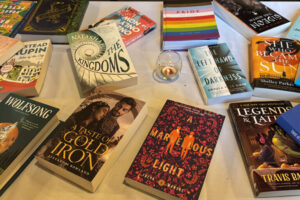
A couple of years into their PhD program, Jay Gordon (CivMin PhD student) found themselves going through a tough time.
“To get support with my mental health, I realized I needed to connect more with people, to build more community,” they say.
“I think a lot of queer students in science, engineering, technology and math — the STEM disciplines — go through something like this at one time or another. And so QueerSphere Grad was born.”
QueerSphere Grad built on the success of QueerSphere, a club started by undergraduate students over a decade ago.
Both groups aim to get people in STEM disciplines involved in and aware of the LGBTQ+ community, and to make engineering at U of T a more welcoming and inclusive place for all.
“At first, QueerSphere Grad was just me on Friday nights, assembling a newsletter from various resources that I’d heard of around U of T,” says Gordon.
“I sent it out to whomever I knew that was queer in the faculty, which was only half a dozen people for the first few months. But slowly, people started asking if they could add their friends. We started a WhatsApp group, and a Discord server, and then started hanging out in person. It was casual stuff at first, like lunches. And we’ve built from there.”
Today, Gordon’s mailing list has grown to over 70 people across U of T Engineering and other STEM departments across U of T. QueerSphere Grad now has official status alongside the original QueerSphere organization, with more than 500 visitors to its website.
QueerSphere Grad regularly hosts Trivia Nights, mixers and other events that enable queer people in STEM to build connections with their peers in academia and industry.
With the support of U of T Engineering’s Diversity, Inclusion and Professionalism Office, members of the club have also travelled to conferences such as Engiqueers Canada.
More recently, QueerSphere Grad has expanded its work into outreach, with booths at science festivals such as Pride in STEM 2024 and Science Rendezvous 2025 — the latter was dubbed ‘Queeriosity Corner.’

Harshit Gujral, a PhD student in the Department of Computer Science, was one of the participants in the Science Rendezvous event.
“We did presentations and demonstrations related to climate solutions and air quality — for example, raising awareness of the fact that a third of all children’s asthma cases are caused by traffic emissions,” he says.
“The latter is the foundation of my doctoral research. For me, building sustainable communities and doing science outreach is as important as doing rigorous science.”
One of QueerSphere Grad’s most recent initiatives is the creation of a small lending library for its members, which they’ve dubbed the Jay Gordon Library for Queer Fiction.
“We believe that stories build bridges between people,” says the project’s lead, a U of T Engineering graduate student who prefers to remain anonymous.
“The hope is that queer people will see themselves represented in these stories, and that allies can learn about our experiences.”
The student says that while U of T libraries have a good amount of queer fiction, the group wanted to create a low-barrier option as well.
“Many of the students at U of T are international, and many countries have less progressive approaches to queerness when compared to Canada,” the student says.
“As such, we felt that many students might feel uncomfortable borrowing queer books when their name will be registered in the university system.”
The collection already numbers around 40 books, including titles such as Gideon The Ninth by Tamsyn Muir, and The Left Hand of Darkness by Ursula K. Le Guin. Anyone wanting to donate, borrow or exchange a book can email grad@queersphere.skule.ca.
As they near the end of their degree program, Gordon says that being a part of QueerSphere Grad has been one of the most rewarding parts of their U of T experience.
“One of the things that drew me back into academia in the first place was that I wanted to be in an environment where I could discuss complex ideas with peers, think, be and be seen as a scientist,” they say.
“At QueerSphere Grad events, we talk about club projects, but sometimes we just talk about scientific ideas, such as how to model sulphur compounds. Talking about science with other bright people, especially from outside your field, is just a cool thing to do. And the fact that we have this shared experience of going through some tough stuff as queer people deepens those conversations with a strong sense of connection.”
– This story was originally published on the University of Toronto’s Faculty of Applied Science and Engineering News Site on June 2, 2025, by Tyler Irving.